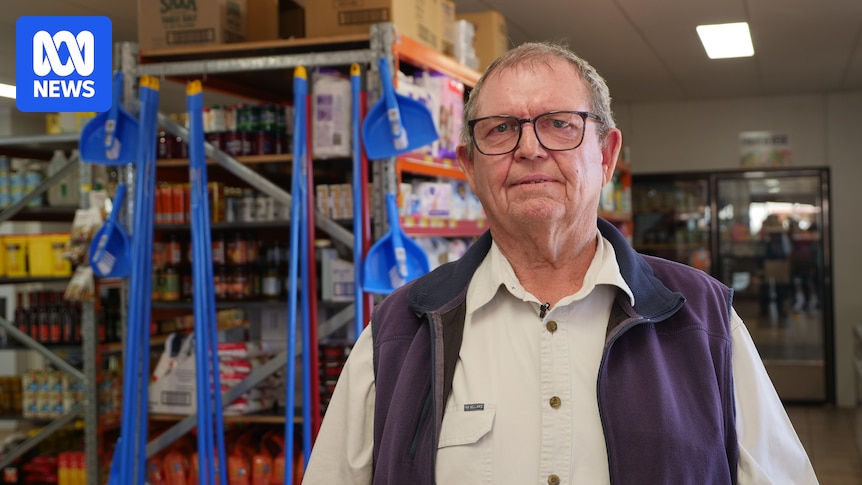
The only grocery shop for hundreds of kilometers in far western Queensland is scaling back its offerings due to the “astronomical” cost of supplying fresh produce. The Simpson Desert Oasis, a multifaceted business in the outback town of Bedourie, is reducing its stock of fresh and frozen goods, leaving residents to grapple with limited options.
Bedourie, a small town near the Northern Territory and South Australian border, is home to just 150 people. For 37 years, Robbie Dare has been at the helm of the Simpson Desert Oasis, a business that serves as a motel, caravan park, roadhouse, restaurant, and grocery shop. Dare, who has also served as the race club president and mayor of the local Diamantina Shire, faces the tough decision of cutting back on grocery supplies due to unsustainable costs.
Challenges of Remote Living
The Oasis will no longer stock most fresh produce and some frozen goods. Dare cites the rising costs of electricity, freight, and fuel as the primary reasons for this decision. “The old bushie in me thinks we can live without it, but a lot of people need it … fruit, fresh milk, ice cream, things like lettuce,” he explained.
Items with short shelf lives, such as raspberries, grapes, strawberries, and cherries, are among those being cut. The shop will continue to supply canned and dry goods, frozen meat, and long-lasting produce like potatoes and onions to keep the roadhouse kitchen operational.
“It hurts a lot to take that bit of happiness away, I suppose, to [not] be able to have things that the city slickers have,” Dare said.
Impact on the Community
The reduction in available groceries has made the weekly shop more challenging for Bedourie residents. Kevin Barr, a local resident, recalls the 1970s when the only food outlet was a “tin shed behind the hotel with no fresh veggies or bread.” He expressed his disappointment at the partial closure of the grocery shop, noting the convenience it once provided.
“To be able to drive down here and walk into a shop and get what you can get out of a normal supermarket in the cities is unbelievable,” Barr said. “To lose it is a bit mind-blowing.”
Without the Oasis, residents like Barr face a 236-kilometer drive to Boulia for groceries or must order online from Townsville supermarkets, 1,200 kilometers away, and wait for the fortnightly truck delivery.
Economic Pressures and Solutions
Electricity, freight, and fuel are significant challenges for running a shop in the bush. Dare has been losing money due to growing overheads. Bedourie can be isolated by road for months during the wet season, prompting the Oasis to maintain about 19 freezers for residents’ needs. By cutting back on frozen goods and fresh produce, Dare plans to turn off half of the freezers to save on electricity.
Last summer, the power bill for the Oasis reached $9,800 a month. As a “large customer” using over 100 megawatt-hours of electricity annually, the business faces higher tariffs and service fees.
The cost of freight is another burden. For instance, a punnet of strawberries must be trucked 1,500 kilometers from Brisbane, with freight costs reaching about $700 per tonne. Dare and other business owners in the bush are desperate for increased freight subsidies.
“It’s all these little costs that compound and, at the end of the day, it’s just too much for us,” Dare said.
Government Response and Future Prospects
Queensland’s vast trucking network means many outback towns receive road or rail freight subsidies to keep costs down. However, Bedourie receives no such assistance. A spokesperson for the Department of Transport and Main Roads (TMR) acknowledged the challenges faced by communities like Diamantina and recognized the importance of affordable freight services.
“TMR is exploring options to enhance freight-subsidy initiatives and assess how subsidized freight services can continue to best support Queensland communities most in need,” the spokesperson said.
While Member for Gregory Sean Dillon stopped short of promising a freight subsidy for Bedourie, he emphasized the need for equitable solutions that provide better road access and support for the trucking industry.
“For people in that region to maintain their livability, they’ll need certainty from the government, and that’s what we intend to provide,” Dillon stated.
The future of Bedourie’s grocery supply remains uncertain, but the community’s resilience and the potential for government intervention offer a glimmer of hope for this remote outback town.





